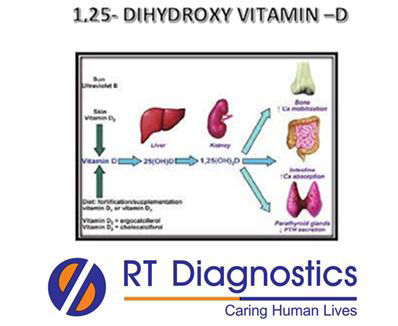1, 25-Dihydroxy Vitamin - D
This test is a good indication of how much vitamin D the body has. Thus can determine if the levels of vitamin D are high or low in the body (comparing with the normal recommended daily allowance- RDA, if within the reference range limits). Since vitamin- D is a fat-soluble vitamin, excess levels (in particular) can lead to a condition called hypervitaminosis. Thus it is important because when the levels go either high or low can lead to certain disorders leading to complications.
25 – DIHYDROXY VITAMIN –D:
Vitamin –D is an important element for healthy teeth and bones. 1-25 – Dihydroxy Vitamin –D test evaluates the Vitamin-D present in the blood for examining the issues related to Bone, Vitamin-D deficiency, and parathyroid activity. This test is also known as Calcitriol (1,25 dihydroxy-vitamin D) and 25- Hydroxy Vitamin-D.
CLINICAL INFORMATION :
This test is usually done for altered levels of vitamin-D i.e. either in high or low. This test is suggested in patients with symptoms of bone weakness, bone malformation, abnormal metabolism of calcium (reflected by abnormal calcium, phosphorous, PTH, etc.) resulting in excess or deficiency of vitamin D. Other associated tests include Radio immune assay, ELISA, spectrometry, etc.

General instructions:
Sample Requirement: Specimen - Blood sample drawn from the vein. Test Preparation: None.
NOTE - Sample for specimen collections may vary based on the patient’s condition/cases according to the patient’s presenting complaints/signs or symptoms:
SPECIMEN REQUIREMENT (Special or Rare Cases) - As instructed and guided by Physician / Clinician / Pathologist / as per Laboratory’s requirements, according to procedures and protocols.
This Multi-Specialty Clinical Referral Laboratory “RTDIAGNOSTICS” provides precise and accurate tests with an extensive range of testing services to the medical centres to help in the diagnosis and identification of pathology in the test specimens for infectious diseases and also to evaluate the function of organ systems of the patient. It prevents further complications and helps to stabilize and restore health to near normalcy at the earliest without delay.



